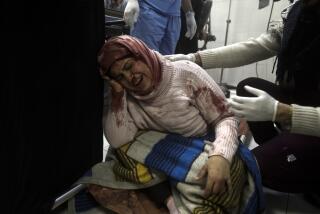U.N. Gives Iraq Go -Ahead to Sell Oil for Food
UNITED NATIONS — Iraq will be permitted to sell $2 billion worth of oil on world markets over the next six months in a long-delayed deal that allows President Saddam Hussein’s government to use most of the proceeds to relieve malnutrition and disease in Iraq, the United Nations decided Monday.
This will be the first break in the sanctions imposed on the Iraqi leader’s government after the 1990 invasion of Kuwait that triggered the 1991 Persian Gulf War. But the U.N. has put in place tough conditions intended to ensure that the oil money is restricted to humanitarian purposes.
Hundreds of inspectors, monitors and aid workers have been selected by the U.N. to measure the oil flowing out of Iraq and supervise distribution of the resulting aid inside the country.
About $1.3 billion will be used for food and medicine in Iraq, with most of the remainder designated to compensate victims of the Kuwait invasion and the war. About $20 million will help pay for ongoing U.N. inspections aimed at destroying Iraq’s weapons of mass destruction.
U.N. Secretary-General Boutros Boutros-Ghali gave the green light Monday to the program in a report to the Security Council, allowing the sale to begin at 12:01 a.m. EST today. But it may take another day for initial contracts to be approved by U.N. overseers and the first oil to hit the pipelines. The program is renewable at six-month intervals.
“This is a victory for the poorest of the poor of Iraq, for the women, the children, the sick and the disabled,” Boutros-Ghali said. “I hope that the humanitarian dimension will always prevail at the United Nations.”
Francesco Paolo Fulci, Italy’s U.N. ambassador and the current Security Council president, called the program the largest relief operation mounted by the world body.
It is expected to take up to six weeks for the first of the food to reach Iraqis because of the time needed to buy commodities and transport them to Iraq, U.N. officials in Baghdad say.
Once in place, the program should improve the daily food ration for Iraqis from 1,200 calories a day to 2,000 calories, said Holdbrook Arthur of the World Food Program in the Iraqi capital. The World Food Program had been running out of wheat and other cereals and had been having difficulty meeting even the meager 1,200-calories-a-day target for the 2.1 million most vulnerable Iraqis.
U.N. officials generally accept Iraqi estimates that the sanctions led to the deaths of 4,500 children a month, saying the figure is in line with what they have observed in hospitals and clinics.
Respiratory infections and diarrhea have been taking the heaviest toll on children, and there have been increasing numbers of cases of severe malnutrition, according to Phillippe Heffinck, the Belgian director of UNICEF in Iraq. Many adults, meanwhile, are succumbing to stress-related illnesses, including heart attacks and strokes, he said.
Nizar Hamdoon, Iraq’s U.N. ambassador, welcomed Monday’s decision and repeated long-held Iraqi hopes that the deal is just the first step toward complete removal of U.N. sanctions. “We look forward to developing the relationship between Iraq and the United Nations necessary for the full lifting of sanctions,” he said.
But Edward W. Gnehm Jr., the United States’ deputy U.N. ambassador, told reporters that while the U.S. supports the limited sale as a humanitarian gesture, it will continue to oppose removal of other sanctions.
Just last week, Rolf Ekeus, who heads the U.N. team monitoring Iraq’s weapons programs, told the Security Council that Baghdad was refusing to cooperate with efforts to confirm it has destroyed missile engines that it contends it dismantled in 1991. Ekeus was in Baghdad on Monday seeking to export the remains of the missile engines to verify that Iraq did not demolish dummies or duds.
The U.N. mission believes that Iraq may be hiding six to 16 long-range missiles and still has not explained satisfactorily the whereabouts of all the materiel it acquired for biological and chemical weapons.
With such concerns in mind, the oil-for-food swap was “designed . . . for a cheater,” Gnehm said Monday.
The flow of oil--most of which will pass through Turkey--will be monitored at a pipeline metering station at Zakhu on the Iraqi-Turkish border, at the pipeline terminal in Ceyhan, Turkey, and in the southern Iraqi port of Mina al Bakr. U.N. inspectors throughout Iraq will seek to guarantee that proceeds of the sale will be limited to humanitarian aid. In northern Iraq, the U.N. will distribute much of the aid itself.
The program had been expected to begin earlier but was delayed by the United States and Boutros-Ghali in September, after Iraqi troops moved into Kurdish-held areas of northern Iraq and the U.S. launched cruise missiles at Iraqi targets in retaliation.
Oil industry analysts said the amount of crude released in the oil-for-food program has been anticipated for so long and is so small--about 500,000 barrels a day at current prices--that it will have minimal impact on world oil prices.
The U.S. government has authorized American firms to participate in the program, and demand appears heavy; 250 companies are reportedly interested in bidding on the oil contracts.
Turner reported from the United Nations and Daniszewski from Riyadh, Saudi Arabia.
More to Read
Sign up for Essential California
The most important California stories and recommendations in your inbox every morning.
You may occasionally receive promotional content from the Los Angeles Times.










